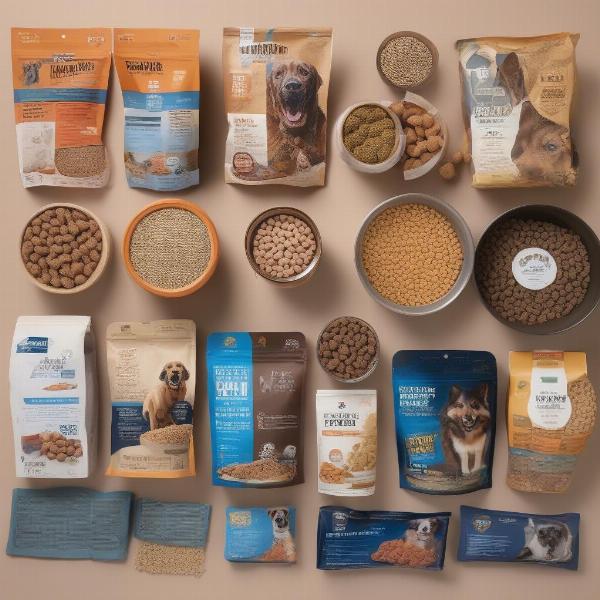Choosing the right food for your hunting dog is crucial for their performance and overall health. A hunting dog’s nutritional needs differ significantly from a house pet’s, demanding a diet that supports their high energy levels and endurance. With so many dog food options available, finding the best dog food for hunting dogs can feel overwhelming. This article will guide you through selecting the optimal nutrition for your hardworking canine companion, covering key factors like protein and fat content, essential nutrients, and understanding your dog’s individual needs.
Fueling the Hunt: Protein and Fat Requirements
Hunting dogs burn a tremendous amount of calories, requiring a higher protein and fat intake compared to less active dogs. Protein is essential for muscle building and repair, while fat provides sustained energy for long days in the field. Look for dog foods with at least 30% protein and 20% fat. High-quality protein sources, such as chicken, beef, lamb, and fish, are preferable. Healthy fats, like those from fish oil and flaxseed, also provide essential fatty acids that support a healthy coat, skin, and joint function.
 High Protein Dog Food
High Protein Dog Food
Essential Nutrients for Peak Performance
Beyond protein and fat, other essential nutrients contribute to a hunting dog’s peak performance. Carbohydrates provide readily available energy, while vitamins and minerals support overall health. Look for dog food fortified with glucosamine and chondroitin for joint health, especially important for dogs engaging in strenuous activity. Antioxidants, such as vitamin E and selenium, can help protect against cellular damage caused by intense exercise.
Choosing the Right Food Type: Kibble vs. Wet vs. Raw
The best type of food for your hunting dog depends on individual factors and preferences. Kibble is a convenient and cost-effective option, offering a complete and balanced diet. Wet food can be more palatable for picky eaters or dogs with dental issues. Raw diets are gaining popularity but require careful preparation and monitoring to ensure nutritional balance and prevent bacterial contamination.
Tailoring Nutrition to Your Dog’s Individual Needs
Factors such as breed, age, activity level, and any underlying health conditions can influence your dog’s nutritional requirements. A young, highly active dog will need more calories than an older, less active dog. Consult with your veterinarian to determine the ideal caloric intake and nutrient profile for your specific hunting dog. They can help you assess your dog’s individual needs and recommend the best dog food accordingly.
Hydration: A Crucial Element for Hunting Dogs
Keeping your hunting dog well-hydrated is vital, especially during strenuous activity in warm weather. Always ensure fresh water is readily available, both at home and in the field. Consider carrying a collapsible water bowl and offering water breaks throughout the hunt.
Decoding Dog Food Labels
Understanding dog food labels can be tricky. Look for the AAFCO (Association of American Feed Control Officials) statement, indicating that the food meets minimum nutritional requirements. The ingredient list is listed in descending order by weight. Avoid foods with fillers, artificial colors, flavors, and preservatives.
What if My Hunting Dog is a Picky Eater?
Some hunting dogs can be picky eaters, especially after a long day in the field. Try adding warm water or a small amount of low-sodium broth to their kibble to enhance the aroma and palatability. You can also try rotating between different flavors or protein sources to keep them interested in their food.
Conclusion
Choosing the best dog food for your hunting dog involves careful consideration of their unique needs and activity levels. Prioritize high-quality protein and fat sources, essential nutrients, and adequate hydration. By providing optimal nutrition, you can support their peak performance, endurance, and overall health, ensuring they remain your loyal hunting companion for years to come. Remember to consult with your veterinarian to tailor a nutrition plan that best suits your individual dog’s requirements.
FAQ
-
What is the best protein source for hunting dogs? High-quality animal protein sources like chicken, beef, lamb, and fish are excellent choices.
-
How much should I feed my hunting dog? The amount depends on factors like age, breed, activity level, and the specific food. Consult your veterinarian or refer to the feeding guidelines on the dog food packaging.
-
Can I feed my hunting dog a raw diet? Raw diets can be suitable, but require careful planning and preparation to ensure nutritional balance and prevent health risks. Consult with your veterinarian before switching to a raw diet.
-
What are some signs of nutritional deficiency in hunting dogs? Signs can include decreased energy levels, poor coat condition, weight loss, digestive issues, and decreased performance.
-
How important is hydration for hunting dogs? Hydration is crucial, especially during strenuous exercise. Always provide access to fresh water.
-
What should I look for on a dog food label? Look for the AAFCO statement, high-quality protein and fat sources, and a list of essential vitamins and minerals. Avoid fillers and artificial ingredients.
-
How can I encourage my picky hunting dog to eat? Try adding warm water or low-sodium broth to their food, rotating flavors, or offering smaller, more frequent meals.
Related Articles
About ILM Dog
ILM Dog is your trusted global resource for all things canine, offering expert advice on dog breeds, health and medical care, training, nutrition, grooming, and accessories. We are dedicated to providing practical, reliable information to empower dog owners worldwide to provide the best possible care for their four-legged companions. Whether you’re a seasoned hunter or a novice dog owner, we offer a wealth of information to help you navigate every aspect of dog ownership. For personalized guidance and to learn more about our services, contact us at [email protected] or call us at +44 20-3965-8624.